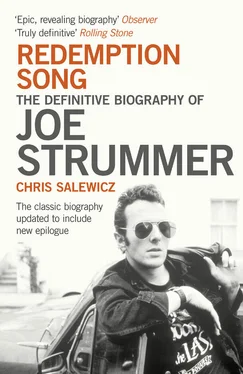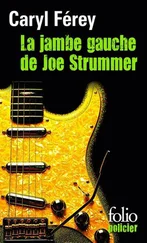Strummer had one brother, David, who was eighteen months older than himself. By the time he reached sixteen, the younger boy had become accustomed to his brother’s far-right leanings – he had joined the National Front – and to the fact that he was obsessed, ‘in a cheap paperback way’, with the occult. Was it this unpleasant cocktail that led David to commit suicide? Whatever, it was clearly a cathartic moment for his younger brother: Joe Strummer often seemed overhung by a mood of mild depression, a constant struggle.
After dropping out of Central College of Art (‘after about a week,’ [he lied about this]), he threw himself into the alternative world of squatting. Moving for a time to Wales, he spent one Christmas on acid listening to Big Youth’s Screaming Target classic and so discovered reggae. One of the main themes propagated by the Clash was the rise of a multi-cultural Britain; in the group’s early music reggae rhythms jostled with an almost puritan sense of rock’n’roll heritage; as the group progressed, it osmosed and absorbed Latin, blues and early hiphop sounds, with Strummer’s never-less-than-heartfelt lyrics making him a modern-day protest singer, in a tradition stretching back to Woody Guthrie.
Positive light to the darkness of the Sex Pistols, the Clash released an incendiary, eponymously titled first album in 1977, the year of punk, a Top Ten hit. With Strummer at the helm, the group toured incessantly: at a show that year at Leeds University, he delivered the customary diatribe of the times: ‘No Elvis, Beatles or Rolling Stones … but John Lennon rules, OK?’ he barked, revealing a principal influence and hero of his own. The next year, after a night spent at a reggae concert, he wrote what he himself felt was his finest song, ‘White Man in Hammersmith Palais’, a blues-ballad that opened up the musical gates for the future of the group. In that song, however, was contained the seeds of a paradox that would become more and more uncomfortable for Strummer: one line spoke of ‘new groups … turning rebellion into money’. Through writing such outsider lyrics, he became a millionaire; his problem was one common to many radical figureheads: how do you remain a folk hero when you have succeeded in your aim and are no longer the underdog? Touring the country that summer of 1978, the group’s concerts were shot for a feature film, Rude Boy , directed by David Mingay and Jack Hazan. ‘He already seemed to be suffering terribly from the notion of being Joe Strummer,’ said Mingay. ‘He wasn’t exactly lying back and having a great time. Joe was always full of contradictions, one of which was that he managed to be both ultra-British and anti-British at the same time.’
With London Calling , their third album, the group achieved commercial American success. Sandinista! , a sprawling three-record set, followed. When it became clear that the album was commercial folly, Joe Strummer demanded the return of their original manager, Bernard Rhodes, a business colleague of Malcolm McLaren and someone with whom Mick Jones had always had an awkward relationship. With Rhodes’s sense of wily situationism powering the group, the potential disaster of Sandinista! was turned into a triumph after the group played seventeen nights at Bond’s in New York’s Times Square. The group were the toast of the town, and only a big commercial hit stood between them and superstardom.
That came in 1982 with Combat Rock , a huge international success, selling five million copies. Strummer bought a substantial terrace house in London’s Notting Hill, yet seemed to feel obliged to justify this possession by explaining that it reminded him of the houses in which he used to squat. By 1983, the Clash had begun to disintegrate; first, heroin-addicted drummer Topper Headon was replaced; then, extraordinarily, Mick Jones was fired, Strummer having gone along with Rhodes’s perversely iconoclastic desire to get rid of the founder of the group. New members were brought in, but the Clash finally fizzled out in 1986.
Strummer’s sense of guilt over the sacking of Jones developed to a point of almost clinical complexity. In the late summer of 1985 he asked me to go for a drink with him. After much alcohol had been consumed, he suddenly announced: ‘I’ve got a big problem: Mick was right about Bernie [Rhodes].’ He had finally realized he had been manipulated. He caught a plane to the Bahamas, where Mick Jones was on holiday: an ounce of grass in his hand, he sought out the guitarist’s hotel, and presented him with this tribute, asking to get the Clash back together. But it was too late: Jones had already formed a new group, Big Audio Dynamite; although Joe Strummer ended up co-producing BAD’s second album, his own plans came to nothing.
A familiar figure on the streets and in the bars of Notting Hill, Joe Strummer was mired – as he later admitted to me – in depression. He tried acting, with a passable role in Alex Cox’s Straight to Hell (1987), and a minor part in the same director’s Walker (1987), for which he also wrote the music; he made a much more significant impression in 1989, playing an English Elvis-like rocker in Jim Jarmusch’s Mystery Train . That same year he released an impressive solo album, Earthquake Weather , and toured. But apart from briefly filling in as singer with the Pogues, he was hardly heard of again. For a time Tim Clark, who now manages Robbie Williams, attempted to guide his career. ‘He was obviously in bad shape,’ Clark told me. ‘He’d turn up for meetings the worse for wear. You could see he was going through a bad time, but you also felt there was probably no one he could really talk to about it.’
After moving out of Notting Hill to a house in Hampshire – he had become worried about his two daughters, he said, after one of them found a syringe in a west London playground – he subsequently split up with his long-term partner Gaby. Remarrying in 1995, to Lucinda Tait, and moving to Bridgwater in Somerset, Joe seemed to find a relative peace. He formed the Mescaleros and began recording again, releasing two excellent albums, Rock Art and the X-Ray Style (1999) and Global A Go-Go (2001), that title a reflection of his interests in world music, about which he presented a regular show on the BBC’s World Service. Strummer was once again touring, incessantly and on a worldwide basis: he was playing to sold-out audiences, with a set that contained a large amount of Clash material. ‘All that’s happening for me now is just a chancer’s bluff,’ he told me in 1999. ‘This is my Indian summer … I learnt that fame is an illusion and everything about it is just a joke. I’m far more dangerous now, because I don’t care at all.’
One of Joe Strummer’s last concerts was at Acton Town Hall last month, a benefit for the Fire Brigades Union. Andy Gilchrist, the leader of the FBU, was apparently politicized after seeing the Clash perform a ‘Rock Against Racism’ concert in Hackney in 1978, and had asked Strummer if he would play the Acton show. That night Mick Jones joined him onstage, the first time they had performed live together since Jones had been so unfairly booted out of the Clash. ‘I nearly didn’t go. I’m glad I did,’ said the guitarist, the poetry of that reunion clear to him.
Bitterly critical that the present Labour government has betrayed many of its former ideals, Joe Strummer was delighted at the show for the firemen; a smile came over his face at the idea that, if only tangentially, his former group was still capable of causing discomfort for those in power. His death, however, comes as a deep shock. After considerable time in the wilderness, Joe Strummer seemed to have reinvented himself as a kind of Johnny Cash-like elder statesman of British rock’n’roll, a much-loved artist and everyman figure. ‘I still thought he’d be doing this in thirty years time,’ said his friend, the film director Don Letts.
Читать дальше












